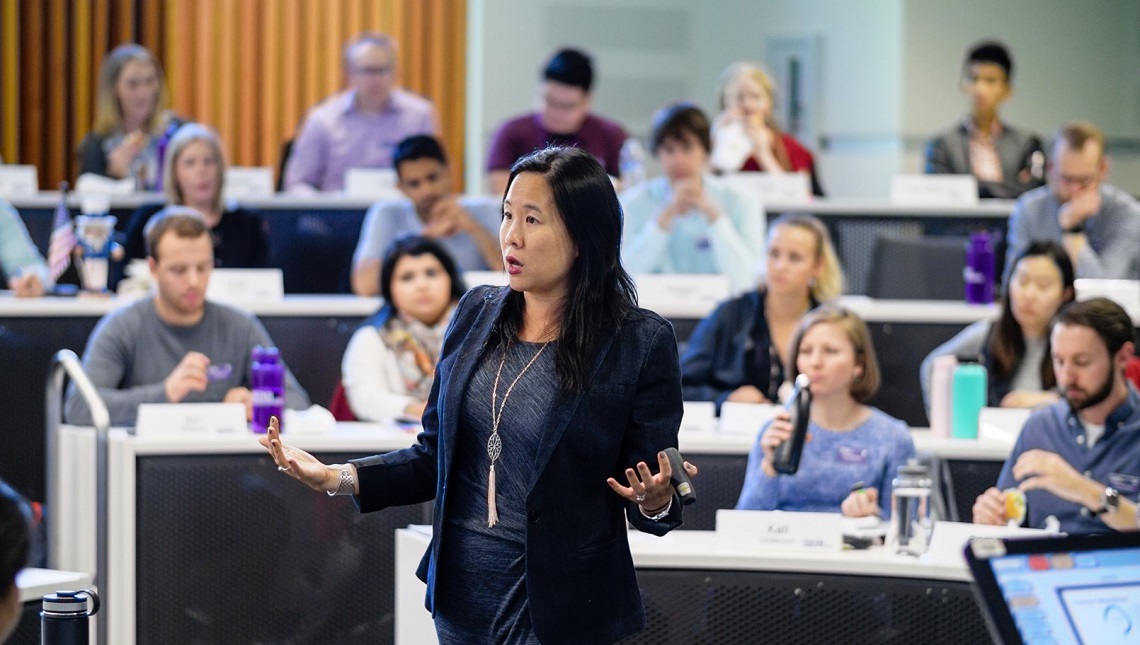Build Better Networks
Christina Fong shares four keys to more expansive and effective professional networking
What’s one of the best things you can do to can enhance your life, your career and your effectiveness as a leader? Network—smarter.
The return of in-person meetings, events and activities after pandemic restrictions means it is time to work those atrophied networking muscles back into shape (or build some new ones).
We asked networking expert Christina Fong to share some of the wisdom she imparts to Foster students. Fong is a teaching professor of management, the William D. Bradford Endowed Professor and a faculty member of the Center for Leadership and Strategic Thinking. She is the former associate dean of inclusion and diversity and current associate dean of undergraduate programs.
Foster Business: Are effective networkers born or made?
Christina Fong: There is some research that indicates that your personality does affect the type of network that you tend to be in. That being said, no matter how introverted or extroverted or selfless or Machiavellian you may be, we all can improve our networking effectiveness.
Okay, then, let’s cut to the chase. What can we do to become more effective networkers?
There are some specific behaviors we can improve upon. I’d categorize them into four actions:
- Meet new people at networking events.
- Diversify your network.
- Expand your conversation topics.
- Follow your passions (or, don’t try to fake it).
Isn’t meeting new people what networking events are for?
You’d be surprised. Researchers who tracked the interactions of people wearing GPS-embedded nametags found that the vast majority of people at networking events and parties tend to talk only to people they already know. To make the most of a networking opportunity, I urge people to push themselves to break out of their circle of friends and acquaintances, and actually meet new people. Introduce yourself to someone you don’t know. Strike up a conversation with a stranger.
What do you mean by “diversifying” your network?
The most effective networkers are those who connect with others who are dissimilar to themselves. As we build our inclusive leadership skills, we want to pay special attention to how we build relationships with those who are different from us.
Changing the way we think about networking—from how to use people to how to help people—is often a first step in becoming a better relational leader.
Effective networkers resist the tendency to connect with those with whom they will agree and see the world similarly; the job of the inclusive leader is to be able to listen, learn from, and work with a greater diversity of contact. This means knowing people in different industries and walks of life, from different demographic backgrounds and of different ages. We especially encourage more senior executives to connect with younger colleagues.
What’s the point of expanding conversation topics? Shouldn’t networking be focused?
We tend to talk about school with our school friends, church with our church friends, and work with our work friends. But the most effective networkers are able to toggle between different domains of conversation with different people. A great example is the Silicon Valley venture capitalist Heidi Roizen who is famous for blurring the lines between personal and professional in her extensive and powerful network.
Passion is great, but don’t we sometimes have to attend events that don’t really excite us?
Maybe, but don’t expect to get much out of them. Many of our students make the mistake of going to events they think they should attend or where high-powered people will be. But we don’t typically make meaningful connections at such events because we appear calculating as opposed to genuinely interested. When you follow your passion, your body language changes. Your enthusiasm and openness is incredibly attractive.
What’s the biggest misconception people have about networking?
That it needs to be self-serving, viewing people as instruments to our own objectives. Francesca Gino calls this “dirty networking,” and her studies show that it makes us feel literally contaminated. It is not sustainable. If you are trying to use your network only to help yourself, you are not going to be as successful as if you use your network to help other people. At Foster we talk a lot about the work of Adam Grant, best-selling author of “Give and Take” (and several other bestsellers). One counterintuitive takeaway from his work: people who spend time giving to others can be more successful, over time, than those who take from their networks or try to broker a fair exchange of giving and taking.

How can you be a giver without being taken advantage of?
As Grant points out, the most successful givers schedule particular times that they dedicate to helping other people. They also develop some particular expertise to offer their network, some added value that complements the expertise of others. Finally, they recognize that helping others—in a controlled and intentional fashion—actually relieves their own stress, and makes them more productive, even during their busiest periods.
How does effective networking lead to more effective leadership?
You can’t be a leader by yourself. The most influential and effective leaders, especially in the long run, are those who build communities in which it’s easy for everyone to help everyone else. Connectors. Catalysts. Changing the way we think about networking—from how to use people to how to help people—is often a first step in becoming a better relational leader.
With some work, this is attainable to any personality type. Many of our students enter the Foster School thinking I can either help myself or others. But the big “aha” moment is that these are not mutually exclusive. Helping others doesn’t mean you’re not helping yourself. Most of the time, our self-interests are aligned with helping others.
